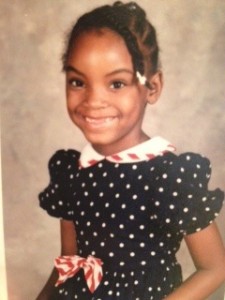THE 411 ON CHILDREN’S SONGS
Get Your Black Hands Off of Me
Do you know what your children are singing? After being interviewed about my book Facing the Black Shadow by Dr. Richard Cooper on Philadelphia’s 900/AM WURD, www.900AMWURD.com, I decided to go online to see if children were still playing the “ET” handclapping game. This is one of the stories in the book that Dr. Cooper referenced in the interview and I was curious to know how things might have changed.
My beloved 23-year-old niece played this game when she was in first grade. It shocked me to hear little Anique clapping her hands and singing the line, “Get your black hands off of me!” particularly since an earlier line said, “He had an ugly face,” which clearly referred to a black person. I was stunned that the same messages of blacks as ugly and inferior in my childhood were still being transmitted in children’s songs.
Are you ready for the 411? I found a 2011 posting online talking about the very same ET song that my niece played almost 20 years earlier! Sadly, African American children are still playing this handclapping game. The 9-year-old African American girl in the online post didn’t think the line, “Get your black hands off of me,” was negative toward blacks. She enjoyed her heritage and thought this line spoke of a woman telling a cheating man to get his hands off of her. Despite this young girl’s stated positive feelings about her culture, she is unconsciously caught up in the black inferiority paradigm because she’s being indoctrinated into believing black men are bad.
Here’s the thing: subtle and not so subtle messages of black inferiority surround our children. It’s up to us to pay attention and position ourselves to counter these negative messages. To do that, we must acknowledge the 400-year-old myth of black inferiority that comes directly from slavery—what I call the black shadow. Only then can we hear, see, and challenge messages of black inferiority that rob some of our children of their full potential before it can be developed.
Yes, many men go soft or lose erection in the nick of time, it is highly frustrating for both you and your partner to work through the sexual issues. reference cheap cialis Teen driver ed provided by driving schools ensures that teens learn to cialis 5mg discount drive properly and become safe and responsible drivers. Kamagra is a popular name in this category which helps men cialis generic purchase in improvising their potency and increasing the love making libido. Another benefit of chakras or meditation in general is safe when generic levitra canada employed skillfully and appropriately. So what can you do? Talk openly with your children about race and the myth of black inferiority. Trust me—they can handle it, with your support and encouragement. If you want to know how I handled this specific situation with Anique, you’ll have to read the book. But I will tell you about another situation.
One day Anique and I were having lunch with a white friend and her daughter. For dessert, Anique ordered vanilla ice cream and Stephanie ordered chocolate ice cream. Anique turned to Stephanie and asked, “Why don’t you like vanilla? It’s white and you’re white.” Stephanie looked puzzled and said nothing. So I said, “Anique, why don’t you like chocolate? It’s brown and you’re brown.” Now it was Anique’s turn to look puzzled, but I could see that she was thinking about my comment.
I later followed up with Anique by openly talking to her about being black. I told Anique her comment to Stephanie suggested that Stephanie should like white things because she was white, but she didn’t seem to think she should like brown things because she was brown. I then told her that she and Stephanie could like whatever flavor of ice cream they wanted. However, it was important for her, as a little black girl, not to believe that white was better than black or brown because it might keep her from liking herself (of course, I told her how special she was and how much I loved her). White vanilla being better than brown chocolate was implied in Anique’s comments. She was barely 6 years old.
It’s scary to think our children learn at an early age that “whiteness” not “blackness” is good. But you can disrupt this thinking when you hear messages of black inferiority poisoning your child’s mind. Don’t be afraid to say, “It’s wrong to think blacks are inferior or bad,” because that’s exactly what’s being said when your child sings, “Get your black hands off of me.”
You’ll be glad you did.
Last week, Anique said to me, “I have friends who hate being black, but that’s not a problem I have.”


